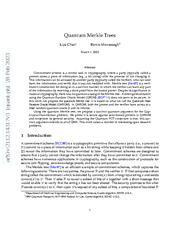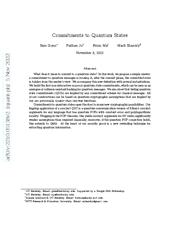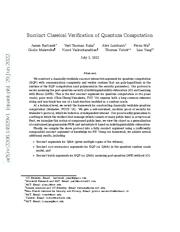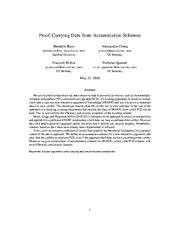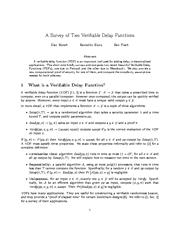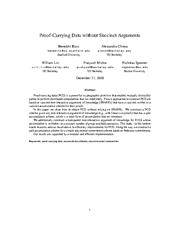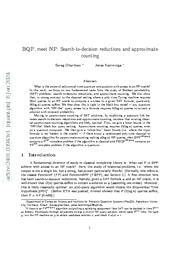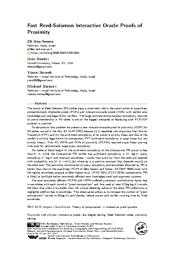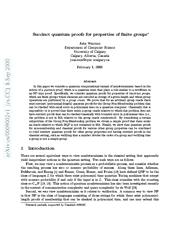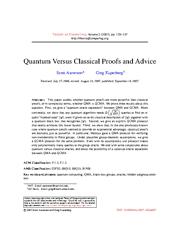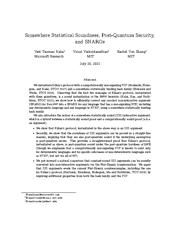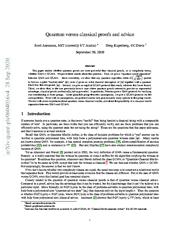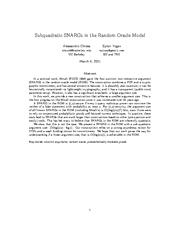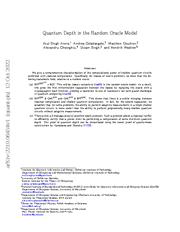A copy of this work was available on the public web and has been preserved in the Wayback Machine. The capture dates from 2023; you can also visit the original URL.
The file type is application/pdf.
Filters
Quantum Merkle Trees
[article]
2023
arXiv
pre-print
In this work, we propose the quantum Merkle tree. It is based on what we call the Quantum Haar Random Oracle Model (QHROM). ...
Despite its significance in classical cryptography, there was no quantum analog of the Merkle tree. A direct generalization using the Quantum Random Oracle Model (QROM) does not seem to be secure. ...
This work was done while L.C. did an internship at IBM Quantum Research. L. C. is supported by NSF CCF-2127597 and an IBM Fellowship. ...
arXiv:2112.14317v3
fatcat:jhntqgsb6zhxvkebuy7ovwz7zm
Commitments to Quantum States
[article]
2022
arXiv
pre-print
Plugging in the PCP theorem, this yields succinct arguments for NP under significantly weaker assumptions than required classically; moreover, if the quantum PCP conjecture holds, this extends to QMA. ...
Our flagship application of a succinct QSC is a quantum-communication version of Kilian's succinct arguments for any language that has quantum PCPs with constant error and polylogarithmic locality. ...
We thank Alex Lombardi for many insightful conversations throughout the course of this project and countless suggestions that greatly improved the paper. ...
arXiv:2210.05138v2
fatcat:45rdniebvzfcfixhbyji66wagq
Succinct Classical Verification of Quantum Computation
[article]
2022
arXiv
pre-print
random oracle model, and - Succinct batch arguments for BQP (or QMA) assuming post-quantum LWE (without iO). ...
modeled as a random oracle. ...
AL is supported in part by a Charles M. Vest fellowship. GM is partially supported by the German Federal Ministry of Education and Research BMBF (grant 16K15K042, project 6GEM). ...
arXiv:2206.14929v1
fatcat:ngofkf36e5ahhbwka2d5vcbse4
Proof-Carrying Data from Accumulation Schemes
[article]
2020
IACR Cryptology ePrint Archive
All existing approaches to recursive composition take a succinct non-interactive argument of knowledge (SNARK) and use it to prove a statement about its own verifier. ...
This technique requires that the verifier run in time sublinear in the size of the statement it is checking, a strong requirement that restricts the class of SNARKs from which PCD can be built. ...
This research was supported in part by: the Berkeley Haas Blockchain Initiative and a donation from the Ethereum Foundation. ...
dblp:journals/iacr/BunzCMS20
fatcat:bcn4mt6ld5e4zou5yz4jx2p52e
A Survey of Two Verifiable Delay Functions
[article]
2018
IACR Cryptology ePrint Archive
A verifiable delay function (VDF) is an important tool used for adding delay in decentralized applications. ...
We also provide a new computational proof of security for one of them, and compare the complexity assumptions needed for both schemes. ...
shown to be secure by an analysis in the random oracle model. ...
dblp:journals/iacr/BonehBF18
fatcat:dlrt6ipcknddpm6etoxqyahkgy
Proof-Carrying Data without Succinct Arguments
[article]
2020
IACR Cryptology ePrint Archive
This leads, via the random oracle heuristic and our result above, to efficiency improvements for PCD. ...
Known approaches to construct PCD are based on succinct non-interactive arguments of knowledge (SNARKs) that have a succinct verifier or a succinct accumulation scheme for their proofs. ...
Acknowledgements
References
Acknowledgements This research was supported in part by the Ethereum Foundation, NSF, DARPA, a grant from ONR, and the Simons Foundation. ...
dblp:journals/iacr/BunzCLMS20
fatcat:wqcb6zojbvertdda3podp7poom
BQP, meet NP: Search-to-decision reductions and approximate counting
[article]
2024
arXiv
pre-print
We then give a "white-box" lower bound (i.e. where the input formula is not hidden in the oracle) - if there exists a randomized poly-time classical or quantum algorithm for approximate counting making ...
What is the power of polynomial-time quantum computation with access to an NP oracle? ...
With the standard oracle model we will refer to the oracle model that is usually used in quantum query complexity. ...
arXiv:2401.03943v1
fatcat:db5jehpcgjd5dascqnhb3zaeai
Fast Reed-Solomon Interactive Oracle Proofs of Proximity
2018
International Colloquium on Automata, Languages and Programming
The family of Reed-Solomon (RS) codes plays a prominent role in the construction of quasilinear probabilistically checkable proofs (PCPs) and interactive oracle proofs (IOPs) with perfect zero knowledge ...
The large concrete computational complexity required to prove membership in RS codes is one of the biggest obstacles to deploying such PCP/IOP systems in practice. ...
Acknowledgements We thank Justin Drake, Peter Manohar and Nicholas Spooner for helping clarify the presentation and for pointing out and correcting errors in earlier manuscripts. ...
doi:10.4230/lipics.icalp.2018.14
dblp:conf/icalp/Ben-SassonBHR18
fatcat:g6qt45iekjhddot4dne4mfkqti
Succinct quantum proofs for properties of finite groups
[article]
2000
arXiv
pre-print
We prove that for an arbitrary group oracle there exist succinct (polynomial-length) quantum proofs for the Group Non-Membership problem that can be checked with small error in polynomial time on a quantum ...
time (i.e., the problem is not in MA relative to the group oracle constructed). ...
Other problems having succinct quantum proofs Quantum certificates for group non-membership may be used in conjunction with classical certificates for other group properties to obtain succinct quantum ...
arXiv:cs/0009002v1
fatcat:bzsgniq77bedfcrmikd7byfdk4
Quantum versus Classical Proofs and Advice
2007
Proceedings - IEEE Conference on Computational Complexity
We end with some conjectures about quantum versus classical oracles, and about the possibility of a classical oracle separation between QMA and QCMA. ...
First, we give a "quantum oracle separation" between QMA and QCMA. ...
Acknowledgments We thank the anonymous reviewers for their suggestions, and Dorit Aharonov, Laci Babai, Robert Beals, Robert Guralnick, Bill Kantor, and Cris Moore for helpful correspondence. ...
doi:10.1109/ccc.2007.27
dblp:conf/coco/AaronsonK07
fatcat:5spz4nrbxbekdnlhlcjbg5aqoq
Somewhere Statistical Soundness, Post-Quantum Security, and SNARGs for P
[article]
2021
IACR Cryptology ePrint Archive
• We show that Kilian's protocol, instantiated in the above way, is an SSS argument. • Secondly, we show that the soundness of SSS arguments can be proved in a straight-line manner, implying that they ...
convert any succinct non-interactive argument (SNARG) for BatchNP into a SNARG for any language that has a non-signaling PCP, including any deterministic language and any language in NTISP, using a somewhere ...
The Fiat-Shamir paradigm provides a generic way of converting any public-coin interactive protocol into a non-interactive one, in the common random string (CRS) model. ...
dblp:journals/iacr/KalaiVZ21
fatcat:q4ux6amfnreszbxopav6ss74nm
Impossibility of Succinct Quantum Proofs for Collision-Freeness
[article]
2011
arXiv
pre-print
Indeed, we show that relative to some oracle, SZK is not in the counting class A0PP defined by Vyalyi. The proof is a fairly simple extension of the quantum lower bound for the collision problem. ...
This implies that there exists an oracle A such that SZK^A is not contained in QMA^A, answering an eight-year-old open question of the author. ...
Together with its close variants, the collision problem is one of the central problems studied in quantum computing theory; it abstractly models numerous other problems such as graph isomorphism and the ...
arXiv:1101.0403v1
fatcat:tfrcfdod5ncmvanx57mnylwtru
Quantum Versus Classical Proofs and Advice
[article]
2020
arXiv
pre-print
We end with some conjectures about quantum versus classical oracles, and about the possibility of a classical oracle separation between QMA and QCMA. ...
First, we give a "quantum oracle separation" between QMA and QCMA. ...
Acknowledgments We thank the anonymous reviewers for their suggestions, and Dorit Aharonov, Laci Babai, Robert Beals, Robert Guralnick, Bill Kantor, and Cris Moore for helpful correspondence. ...
arXiv:quant-ph/0604056v4
fatcat:u6wyswlsibbpxcodwy7s52fuki
Subquadratic SNARGs in the Random Oracle Model
[article]
2021
IACR Cryptology ePrint Archive
In a seminal work, Micali (FOCS 1994) gave the first succinct non-interactive argument (SNARG) in the random oracle model (ROM). ...
We hope that our work paves the way for understanding if a linear argument size, that is O(log(t/ )), is achievable in the ROM. ...
This work was done (in part) while the second author was visiting the Simons Institute for the Theory of Computing. ...
dblp:journals/iacr/ChiesaY21a
fatcat:5urql44a7bbchfmfjd4x2lmlle
Quantum Depth in the Random Oracle Model
[article]
2022
arXiv
pre-print
This refutes Jozsa's conjecture [QIP 05] in the random oracle model. ...
Specifically, for classes of search problems, we show that the following statements hold, relative to a random oracle: (a) 𝖡𝖯𝖯^𝖰𝖭𝖢^𝖡𝖯𝖯≠𝖡𝖰𝖯. ...
Separations without the random oracle. Our work gives the first instantiatable quantum depth separation by virtue of being in the random oracle model. ...
arXiv:2210.06454v1
fatcat:dq5knhmfzzd3xlk74lr24ukbte
« Previous
Showing results 1 — 15 out of 472 results

